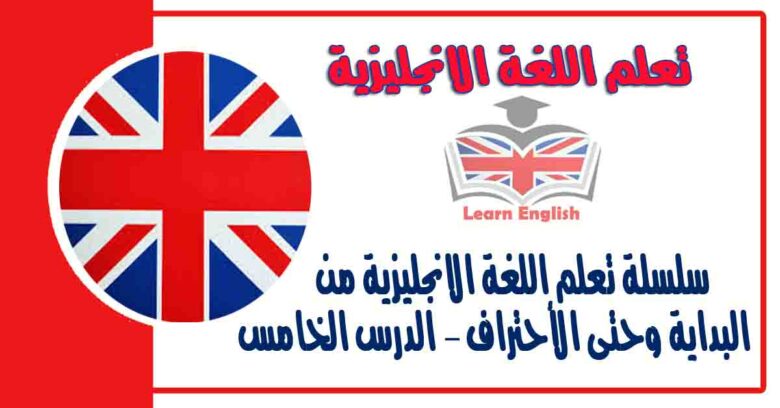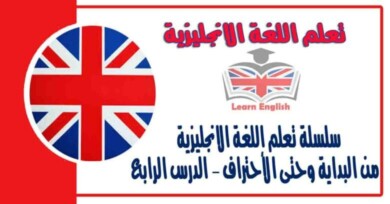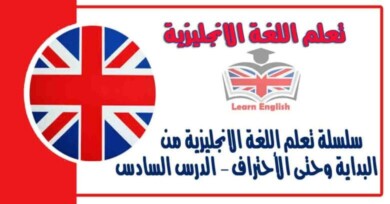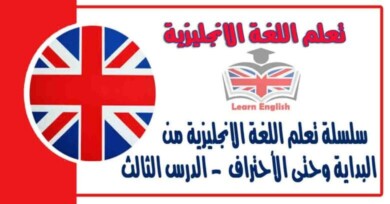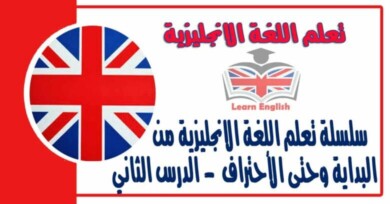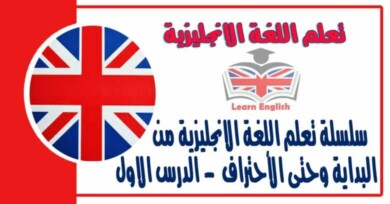سلسلة تعلم اللغة الانجليزية من البداية وحتى الأحتراف – الدرس الخامس
دروس تقدم باللغة الإنجلیزیة ھي دروس إلى جمیع المبتدئین وھي دروس للطلاب المبتدئین و المتوسطین والمتقدمین على حد سواء سلسلة تعلم اللغة الانجليزية من البداية وحتى الأحتراف – الدرس الخامس
كلمات ومعاني
- argue یجادل – یحاجج
- pronounce یلفظ
- baggage أمتعة
- receive یستلم – یستقبل
- confess یعترف
- receptionist مستقبل
- confuse یربك – یخلط
- reply یجیب – یرد
- die یموت
- reserve یحجز – یذخر
- Double room غرفة مزدوجة
- seal یختم
- film فیلم
- spell یتھجأ
- free غیر مشغول – حر
- square مربع – میدان – ساحة
- hopeless يائس
- stick يلصق
- lift مصعد
- tourist سائح
- nearby على مقربة – مجاور
- vacant فارغ – شاغر
- overlook يشرف – يطل على
- visitor زائر
- post یرسل بالبرید
- way طريق – أسلوب
جمل واصطلاحات
- من وقت لآخر
- From time to time
- ازور اخي من وقت لأخر
- I visit my brother from time to time
- لحظة
- One moment
- دعنا نذھب . لحظة – علي ان انھي الرسالة .
- Let’s go!” one moment. I must finish this letter
- على الاقل
- At least
- عمره خمسون عام على الاقل
- He is at least fifty
- برجوع البرید
- By return
- أجاب على رسالتي برجوع البرید
- He answered my letter by return
- دعني أنظر أو ارى
- Let me see
- كم الوقت – دعني انظر – الساعة 6.30
- “What’s the time?” Let me see. It’s 6.30
- یاإلھي – یاسلام – یالك
- Oh, dear
- یاإلھي ! لقد اضعت مظلتي
- What is it? What’s the matter?
- ما المسألة – ماذا جرى
- Oh, dear! I’ve lost my umbrella
- كيف اقدر على الا اخلط بینھم
- How can I help confusing them
قواعد وشرح
1-أسماء الموصول that , which , who
أ- یستعمل اسم الموصول Who في حالة الرفع وWhom في حالة النصب للأشخاص اما Which فتستعمل مع الأشیاء بدون تغییر .
- ھو الرجل الذي جاء أمس
- He is the man who came yesterday
- الرجل الذي رأیتھ ھنا
- The man whom I saw is here
- الكتاب الذي قرأتھ ھناك
- The book which I read is there
ب – تستعمل That عوضا عن which & who حیث ھي تختلف بأنھا تستعمل لتحدید شخص او شيئا.
لاحظ الفرق بين الجملتين :
- My brother who is in Australia sent me this book.
- My brother that is in Australia sent me this book
تقدم جملة فرعية that تقدم جملة فرعية غیر محددة وفي الجملة الثانیة who في الجملة الاولى محددة.
ھكذا في الجمل الفرعية التي ھي وصفیة وغیر محددة یجب استعمال who & which
- البیت الذی هو جمیل یقع قرب النهر .
- The house which is beautiful stands near the river.
- اكیتس الذي كان كاتباً أنجلیزیاً مات عام 1821
- Keats who was an English writer died in 1821
ج- متى نستعمل That عوضا عن which & who
– عند البدایة :
- امل ان تكون ھي الغرفة التي اریدھا
- I do hope it’s the room that I wanted
- لم يكن الطعام ھو الذي لم يحبه
- It wasn’t the food that he disliked
– بعد التفضیل وكلمات every , all , only
- ھي الغرفة الأفضل التي لدیھم
- It’s the best room that they have
- ھو ضابط الجمارك الوحید الذي صادفتھ او قابلته
- He’s only customs officer that I’ve ever met
- ھي صدقت كل كلمة التي ھو قالھا
- She believed every word that he said
– عندما یشیر اسم الموصول الى الاشخاص او الاشیاء
- السیاح والأمتعة الذین وصلوا ھنا الیوم .
- The tourists and baggage that arrived here today.
- الناس و الحوادث الذین وصفھم ھذا الكتاب .
- The people and events that are described in this book.
2- حذف اسم الموصول
أ- في كثير من الجمل المدرجة أعلاه يمكن حذف اسم الموصول لأنه ليس الفاعل ويمكن حذف اسم الموصول إذا كان في حالة نصب .
- الرجل الذي رأیتھ یكون ھنا
- The man (who) I saw is here
- الكتاب الذي قرأته یكون ھناك
- The book (which) I read is there
- ألم تستلم الرسالة التي أنا كتبتھا
- Didn’t you get the letter (that) I wrote
- صدقت كل كلمة التي ھو قالھا
- She believed every word (that) he said
- ھي احسن غرفة التي لدیھم
- It’s the best room (that) they have
ب- في الجمل التالية اسم الموصول ھو الفاعل ولا يمكن حذفه .
- لدیھم غرفة مزدوجة التي تطل على الحديقة .
- They have a double room which overlooks the park.
- رجل الأعمال الذي تحدث الیك البارحة يملك سیارتین .
- The business man who talked to you yesterday has two cars.
3-الجمل الایجابیة مع what
أ- في الجمل الایجابیة فإن what تعني الشيء الذي وتترجم إلى كلمة ما .
- ھذا ما سألت عنه
- That’s what I asked for
- أعطته ما یحتاج الیه او ما ھو أراد
- She gave him what he wanted
The one , The ones
أ- نستعمل ھذه الضمائر عندما نرید تجنب تكرار الكلمة الواحدة .
- الديك غرفة شاغرة
- Have you a room vacant?
- ھناك واحدة قرب المصعد في الطابق الثاني
- There’s the one by the lift on the second floor
- احب ھذه السیارة أكثر من تلك التي انت اشتریتھا
- I like this car better than the one you bought
5-الأرقام
أ- عند استعمال الأعداد الحاوية ثلاثة ارقام نستعملھا غالباً مفصولة ، فغرفة رقم 260 نقول Two sixty عنھا أو Two hundred and sixty
حروف الجر
- To tick stamps on a letter.
- In any other way.
- On the other side of the square.
- Differently from
جمل مترجمة متعلقة بالدرس
- ھذه ھي الفتاة التي أحبھا
- This is the girl that I love
- ھو أحسن كاتب اخرجتھ انجلترا.
- He is the best writer that England has ever produced.
- من وقت لآخر یتوقف المصعد الكائن في فندق كلوستر قبل الوصول الى الطابق الثاني
- From time to time the lift which is in the Gloucester Hotel stops before getting to the second floor
- أنت حر ان تجادل ماقاله
- You are free to argue about what he said
- یجب ان تلفظ لیستر بطریقة تختلف عن تھجئتھا
- You must pronounce Leicester differently from the way it is spelt
- تسلم الامتعة الذي اضاعھا.
- He received the baggage that he had lost
- أخشى ان لا اكون قد ختمت الرسالة التي اعطيتني ایاھا
- I’m afraid I didn’t seal the letter which you gave me
- لن یجیب على الرسالة برجوع البريد لأنه نسى إلصاق طابع علیھا
- He won’t answer the letter by return because he forgot to stick a stamp on.
- هل اشتريت الهدية التي وعدت ان تعطيني ایاھا
- Did you buy the present that you promised to give me
- هذا اغرب فیلم رأيته.
- It’s the strangest film that I’ve ever seen.
- الم تتعلم بعد انك لاتستطيع تھجئتھا
- Haven’t you yet learnt that you can’t spell it?
- حجز رجل الأعمال غرفة مزدوجة تشرف على البحر.
- The business man reserved a double room which overlooked the sea.
- كیف لا أخلط ماقلھ لي ياحبيبتي وانا اطرش.
- How can I help confusing what he told me, darling, when I’m deaf
- ماذا جرى. الیس كل شخص سعید
- What is it? Isn’t everybody happy
- یحب السائح ھذا الفندق اكثر من ذاك الذي على الجانب الآخر من الميدان.
- The tourist likes this hotel better than the one on the other side of the square
المحادثة
یصل ھاري وباربارا إلى فندقھما .
Barbra : No, darling, I don’t confuse things easily.
Harry : Well, you do from time to time.
Harry : (to receptionist) Have you a room reserved for sallies please?
Receptionist: One moment, please sir.
Barbra : Oh, I do hope it’s the room I wanted. They have a double room which
overlooks the park. That’s what I asked for – it’s the best room they have.
Harry : How do you do? “to Pamela”
Receptionist : to harry Sallis, did you say, sir? I’m afraid we have no room reserved for Mr.
Sallis here.
Barbra : But didn’t you get the letter I wrote?
Receptionist: I’m sorry, Madam, We didn’t.
Barbra : But I posted it at least a week ago.
Receptionist : If we’d received it, you would have had a reply. We always answer letters by
return.
Peter : Are you sure you posted the letter, mother?
Barbra: Off course I am! I remember sticking the stamps on and sealing it -.
Harry : Well – we won’t argue. Have you any other rooms vacant?
Receptionist : Let me see! There’s the one by the lift on the second floor – number 260. I
think it was still free this afternoon.
Harry : Oh, good!
No, No. 206’s taken. I’m afraid we’re full t this time of the year, sir. You could
Receptionist : fill a couple of trains with all the tourists and baggage that have arrived only
today!
Barbra: Oh, dear, What are we going to do?
Receptionist: Well, if we can help in any other way. The Gloucester Hotel is always –
Barbra: Gloucester? Did you say Gloucester?
Harry : What’s the matter?
Barbra: I’ve suddenly remembered.
Harry : What? What is it?
Barbra : There was the Gloucester Hotel and – the Leicester Hotel, on the other side of the square .
Harry : Which did you write to?
Barbra: Well – I must confess – I think it was the Leicester.
Harry : Oh, darling, you really re hopeless.
Barbra : I’m sorry. These names are so strange, and they are pronounced quit
differently from the way they’re spelt. How can I help confusing them?
Harry : You must learn them, darling – that’s all!
